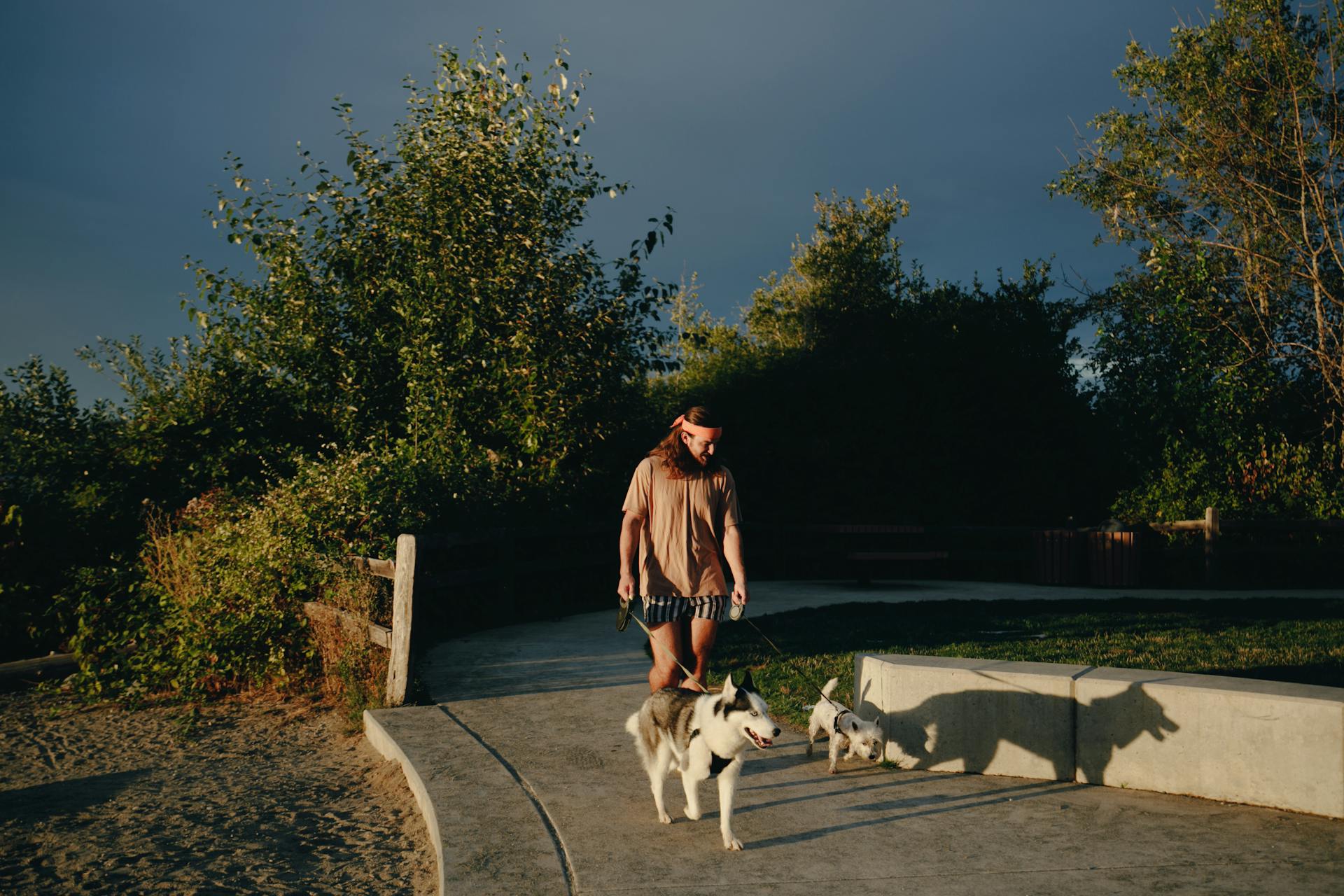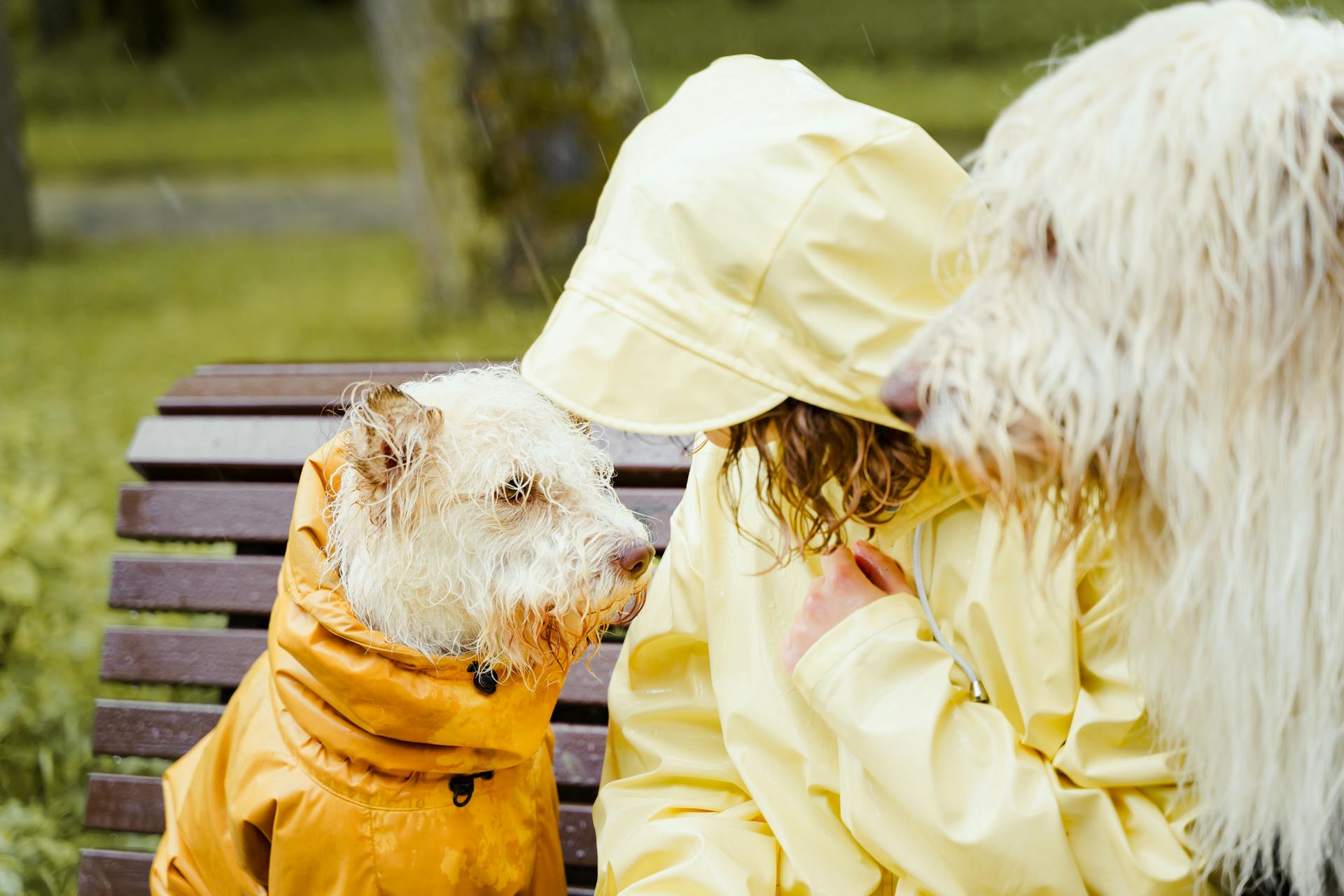
Taking your dog to the dog park can be a great way to provide exercise and socialization, but safety should be your top priority. The risk of disease transmission is a significant concern, especially for puppies and dogs with weakened immune systems.
Parvovirus, also known as parvo, is a highly contagious and potentially life-threatening disease that can be spread through contact with an infected dog's feces. The virus can survive outside of a host for up to a year, making it a persistent threat.
To minimize the risk of disease transmission, it's essential to follow basic hygiene practices such as washing your hands before and after interacting with your dog and disinfecting any equipment or toys that come into contact with the ground.
Preparation and Safety
Taking your dog to the dog park can be a great way to get some exercise and socialization, but it's essential to prepare and prioritize your dog's safety.
Know how to break up a dog fight, as scuffles and altercations can happen at dog parks. Review the steps for breaking up a dog fight safely and download a printable flyer for instant access.
Before taking your dog to the dog park, solidify their basic training, especially name recognition, recall, and leave it. This will help prevent unwanted behaviors and ensure a more enjoyable experience for both you and your dog.
Scout the park beforehand to identify potential trouble spots, such as insecure fencing or crowded entry/exit gates. Take note of how the dogs and people interact, and make sure the park appears clean and well-maintained.
It's also crucial to understand your dog's play style and preferences. If your dog is sensitive or a rough player, choose a park with compatible playmates to avoid any potential conflicts.
Size matters when it comes to dog parks. Avoid bringing smaller dogs to parks frequented by larger dogs to prevent serious injuries. Many dog parks now provide separate areas for big and little dogs, so be sure to check if this is the case.
Here are some key things to consider when choosing a dog park:
By being aware of these factors and taking the necessary precautions, you can help ensure a safe and enjoyable experience for your dog at the dog park.
Health Risks
Taking your dog to the dog park can be a fun and social experience for both of you, but it's essential to be aware of the health risks involved. A study found that 85% of dog parks and 20% of dogs have intestinal parasites.
Dogs can pick up diseases like kennel cough (Bordetella) and canine influenza from other dogs at the park. These respiratory infections can be serious, especially for unvaccinated dogs.
To avoid or decrease the risk of your dog becoming infected, they must be fully vaccinated and current on their heartworm, flea, and tick prevention. Your veterinarian can prescribe additional vaccines, such as Bordetella, if necessary.
Intestinal parasites like hookworms, roundworms, and whipworms are common at dog parks. Keeping your dog on a monthly preventative that prevents common intestinal worms will help.
Dog parks can also be breeding grounds for diseases like parvovirus, which can be fatal if left untreated. Fully vaccinating your dog and keeping them up-to-date on their preventatives can help protect them from these diseases.
For more insights, see: Dog Park Diseases
Here are some diseases and parasites that your dog may be at risk for at the dog park:
- Intestinal parasites: hookworms, roundworms, and whipworms
- Respiratory infections: kennel cough (Bordetella) and canine influenza
- Other infectious diseases: parvovirus
To minimize the risk of your dog getting sick, make sure to keep them away from other dogs' feces, pick up after yourself, and bring your own water and water bowl from home. Always closely monitor your dog's interactions and be prepared to intervene if necessary.
Behavioral and Injury Risks
Taking your dog to the dog park can be a fun and exciting experience, but it's essential to be aware of the potential risks involved. Dog parks can be breeding grounds for injuries and behavioral problems, especially if you're not paying attention.
Bites can happen fast and can be very serious, especially if a big dog bites a small dog. Many times, people have trouble differentiating play behavior from fearful or aggressive behavior.
Dog parks are a free-for-all, with different breeds having different play styles and social behaviors. A herding dog may play very differently than a terrier, so it's crucial to be mindful of what your dog likes and signs that it's enjoying itself or not.
A unique perspective: Dog Parks Helpful
Some of the more worrisome behavioral risks of going to the dog park include being attacked by another dog, practicing inappropriate social interactions, and being a victim of resource guarding between dogs.
Here are some common behavioral dangers to watch out for:
- Being attacked by another dog can cause long-term anxiety or fear of other dogs.
- Practicing inappropriate social interactions, such as pestering, chasing, rolling, or constantly mounting other dogs.
- Being a victim of inappropriate social interactions.
- Increased chances of resource guarding between dogs.
- Predatory behavior: rarely, some dogs can act predatory to other dogs, and this can be dangerous as they see the other dog as prey.
It's also essential to be aware of the risks of not watching your dog the entire time. You should always closely monitor all interactions to ensure safe play is taking place and discontinue play if you notice a change in the play dynamic.
Never bring an un-spayed or un-neutered dog to a dog park, as they may cause additional fights due to hormone levels and behavioral tendencies.
Age and Health Considerations
Puppies under 17 weeks old should not be brought to a dog park due to the risk of contracting diseases like Parvo and distemper, which can be fatal.
Puppies typically finish their vaccinations at 16 weeks old, but need another week for the vaccines to reach full efficacy in their system.
It's recommended to wait until your puppy is at least 6 to 8 months old before going to the dog park, as dog parks can be overwhelming and may cause lifelong fear, anxiety, and aggression in young dogs.
Senior dogs may face higher risks of complications from illnesses at the dog park, especially if they have pre-existing health conditions like arthritis or hip dysplasia.
If your senior dog is slowing down with age but still enjoys the dog park, consider visiting during off-peak hours or when there are fewer dogs in attendance.
Exercise Caution with Unvaccinated Puppies
Taking your unvaccinated puppy to a dog park is a big no-no, as they can pick up diseases and parasites from the soil, water, and other dogs. Intestinal parasites like hookworms, roundworms, and whipworms, as well as respiratory infections like kennel cough (Bordetella) and canine influenza, are just a few examples of the risks they face.
A fresh viewpoint: Food for Dogs with No Teeth
Your veterinarian can prescribe de-wormer medication if necessary, but it's essential to keep your unvaccinated dog away from any dogs showing signs of illness, such as diarrhea, vomiting, sneezing, and coughing.
Puppies typically finish their vaccinations at 16 weeks old, but need another week for the vaccines to reach full efficacy in their system. This means a minimum of 17 weeks old before they can safely visit a dog park.
If you do take your unvaccinated puppy to a friend's house, make sure their dogs are appropriately vaccinated and healthy. You can still socialize your puppy safely by picking them up and exposing them to new things, as long as they don't touch the ground or come into contact with other dogs' waste.
Here's a rough guide to help you navigate socialization with your unvaccinated puppy:
Should Senior Go?
Senior dogs face unique challenges at the dog park, especially when it comes to their health and mobility. They're more susceptible to accidental injuries from other dogs, which could be devastating for a dog with arthritis or hip dysplasia.

As dogs age, they often become more selective about their playmates and may not be as social as they were in their younger years. If your senior dog is showing signs of pain or soreness after a visit to the dog park, it's a clear indication that they need to stick to shorter visits or find alternative exercise options.
If your senior dog is still enjoying the dog park environment, consider taking them during off-peak hours when there are fewer dogs around. This can help reduce the risk of them getting overwhelmed or injured.
General Guidelines and Tips
Leaving your dog's favorite toys and treats at home can minimize the risk of dog fights, as some dogs can become aggressive when guarding them.
Consider purchasing an air horn to safely break up dog fights without having to risk getting bitten, as the loud noise can startle fighting dogs long enough for them to release their grip on one another.
Red Flags and Alternatives
If your dog displays fear- or anxiety-driven behaviors at home, such as yawning a lot, pacing, or panting, it's best to skip the dog park altogether.
Some dogs are naturally more aggressive or possessive, and if your pup is protective of you, toys, or food, it's a red flag for dog park safety.
If your dog doesn't play well with other dogs or starts to growl, excessively bark, or makes slow, deliberate movements when another dog approaches, it's a sign that he feels uncomfortable or even threatened.
If your dog acts hesitant on walks, it's a sign that he's probably feeling nervous and may not do well at a dog park.
The majority opinion within the dog trainer community is that dog parks are not a good choice for most dogs.
Some dogs just aren't going to do well in the dog park at all – not now or ever.
If your dog has ever shown fear, aggression, social anxiety, resource guarding, or otherwise has shown they do not enjoy group dog play, it's best to avoid the dog park.
If your dog is not friendly, healthy, or already socialized with other dogs and people, it's best to explore alternative options for exercise and socialization.
Frequently Asked Questions
Should I stop taking my dog to the dog park?
If you notice your dog or others are acting aggressively or not having fun at the dog park, it's best to leave and reassess your dog's needs. Consider alternative exercise options that prioritize your dog's enjoyment and safety.
Why don't I take my dog to the dog park?
To minimize the risk of your dog getting sick, consider alternative play areas where vaccination status can be verified and proper waste disposal is ensured
Sources
- https://www.24petwatch.com/ca/blog/dog-park-etiquette
- https://www.preventivevet.com/dogs/what-you-should-know-before-taking-your-puppy-to-the-dog-park
- https://www.zoetispetcare.com/blog/article/potential-dangers-dog-parks
- https://www.dailypaws.com/dogs-puppies/dog-exercise-play/are-dog-parks-safe-for-all-dogs
- https://www.thesprucepets.com/how-to-keep-your-dog-safe-at-the-dog-park-5217029
Featured Images: pexels.com


